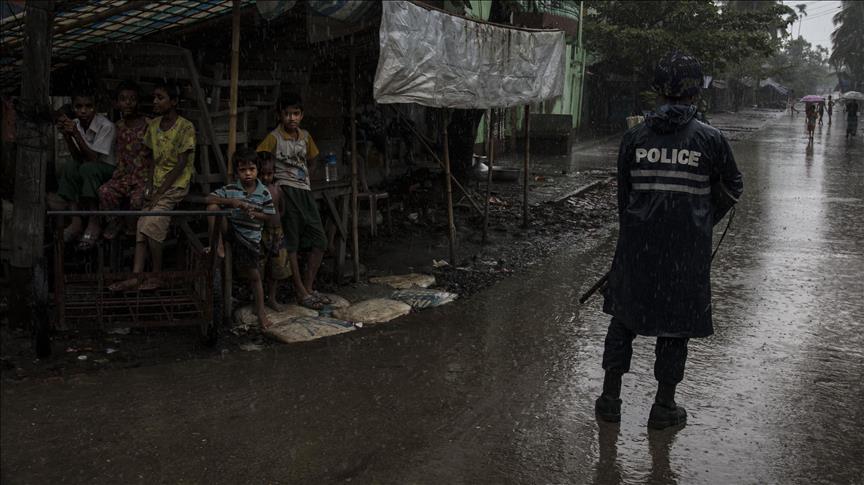Myanmar commission’s report on Rakhine ‘flawed’: HRW
Rights group slams government-appointed probe commission’s dismissal of reports on abuses against Rohingya Muslims

Yangon
By Kyaw Ye Lynn
YANGON, Myanmar
An international rights group has slammed an investigation commission appointed by Myanmar’s government for claiming that most reports accusing security forces of rights abuses against Rohingya Muslims are “fabricated”.
After the commission submitted an interim report Wednesday on its findings related to fatal Oct. 9 attacks on police in troubled Rakhine State and a subsequent military crackdown, Human Rights Watch (HRW) called it “methodologically flawed” and “a classic example of pre-baked political conclusions”.
Ever since the military placed northern Rakhine -- an area predominantly inhabited by stateless Rohingya Muslims -- under lockdown after Oct. 9, dozens of Rohingya have been killed and security forces accused of rape, mass killing and arson attacks.
In response to growing concerns from the international community, the government led by State Counselor Aung San Suu Kyi -- a Nobel Peace laureate -- formed the commission last month, tasking it with probing the initial attacks and subsequent military operations.
The announcement of its formation was met with immediate criticism due to it being chaired by one of Myanmar’s vice-presidents, Myint Swe -- a former military general believed to be responsible for a brutal crackdown on peaceful protesters in 2007 that became known as the Saffron Revolution.
The report submitted Wednesday said the commission made special investigations into allegations of rape cases, illegal arrests, torture and arsons in villages inhabited by “Bengali” -- a term that suggests Rohingya are interlopers from neighboring Bangladesh and fuels the notion that they don't belong in Myanmar.
“Concerning the claims that women were raped, the Commission interviewed local villagers and women using various methods, finding insufficient evidence to take legal action up to this date,” it said.
“As to the arsons, investigations are under way to get sufficient evidence. Illegal arrests and torture are also being investigated.”
The report also said there were no cases of genocide and religious persecution in the region, citing the “Bengali” population residing in Maungtaw district and the “increasing population” of mosques and religious edifices.
New York-based HRW has described the report as “a classic example of pre-baked political conclusions to assert the situation is not so bad, designed to push back against international community pressure”.
“Their astonishing finding that there was no religious persecution against the Rohingya because they saw mosques is methodologically flawed,” the group’s deputy Asia director, Phil Robertson, told Anadolu Agency.
He accused the commission of being unwilling to conduct a serious investigation into the allegations and thereby risk uncovering a “litany of rights violations” against Rohingya Muslims, and of instead preferring to deny and denigrate what it calls “external allegations”.
“This commission is turning out to be precisely the Myanmar government whitewash machine that we feared it would be when we first saw the list of members,” he underlined.
The denials in the report come just days after the Myanmar President’s Office announced that four policemen were detained in response to a video clip showing officers beating Rohingya villagers in Koe Tan Kauk village in Maungdaw district Nov. 5 -- two days after a United Nations-led 10-member delegation visited the area.
The clip -- filmed by a Myanmar policeman, which has gone viral on social media -- shows a large group of Rohingya -- including boys -- forced to sit on the ground with their hands on their heads as they are beaten and kicked by police.
The video offers the first visual evidence of a litany of abuses human rights groups have claimed have taken place against the long-persecuted Muslim minority in recent months.
“We fear that it is really just the tip of the iceberg of the abuses being inflicted by government security forces and that much more is happening out of sight,” Robertson said in an email Wednesday.
The area has been under strict military control since Oct. 9 when a gang killed nine border police officials in an area close to Myanmar's western border with Bangladesh.
In the subsequent clampdown, aid agencies and independent journalists were denied access to majority Rohingya areas, and at least 96 people -- 17 police and soldiers, three Muslim men working closely with the local authority, and 76 alleged "attackers" (including six who reportedly died during interrogation) -- were killed and around 600 suspects detained for alleged involvement.
Rohingya advocacy groups, however, claim around 400 Rohingya -- described by the UN as among the most persecuted groups worldwide -- were killed in the military operations, women were raped and Rohingya villages torched.
Anadolu Agency website contains only a portion of the news stories offered to subscribers in the AA News Broadcasting System (HAS), and in summarized form. Please contact us for subscription options.

